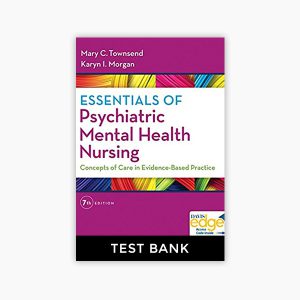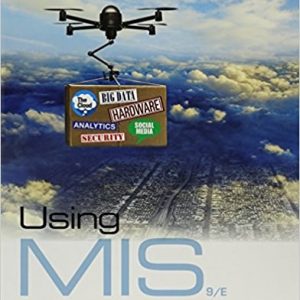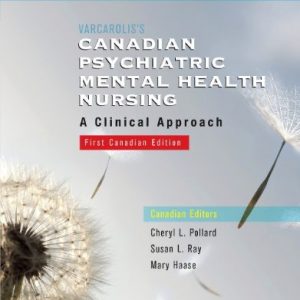Instant download Essentials of Psychiatric Mental Health Nursing 7th Edition Test Bank pdf docx epub after payment.

Product details:
- ISBN-10 : 9780803658608
- ISBN-13 : 978-0803658608
- Author:
- Taxonomy and diagnostic criteria from the DSM-5 with references for each DSM-5 diagnosis
- Quality Safety Education for Nurses (QSEN) activities with guidelines for attaining the knowledge, skills, and attitudes required to fulfill the initiative’s core competencies
- Therapeutic communication icon that highlights talking points and interventions in the care plans to help students feel more comfortable with patients
- Homework assignments at the beginning of each chapter to encourage critical reading
- Emphasis on holistic nursing to emphasize the physical, spiritual, and cultural aspects of psychiatric/mental health nursing
- Core concepts listed at the beginning of each chapter and defined in boxes throughout the text
- Concept map care plans for all major psychiatric diagnoses
- Care Plans for clients with DSM-5 diagnoses featuring interventions and rationales for commonly observed nursing diagnoses
- ANA standards for clinical practice for DSM diagnoses and therapeutic interventions, as well as for aging individuals, bereaved individuals, and victims of abuse and neglect
- Boxes highlighting client/family education communications and tables listing important topics for discussion including client/family education
- Case studies and exercises designed to stimulate critical thinking
Table of contents:
- Unit 1 Introduction toPsychiatric MentalHealth Concepts
- Chapter 1 Mental Health and Mental Illness
- Introduction
- Mental Illness
- Mental Health
- Physical and Psychological Responses to Stress
- Physical Responses
- Psychological Responses
- Summary and Key Points
- Chapter 2 Biological Implications
- Introduction
- The Nervous System: An Anatomical Review
- The Brain
- Nerve Tissue
- Autonomic Nervous System
- Neurotransmitters
- Neuroendocrinology
- Pituitary Gland
- Circadian Rhythms
- Genetics
- Psychoneuroimmunology (PNI)
- Normal Immune Response
- Psychopharmacology and the Brain
- Implications for Nursing
- Summary and Key Points
- Chapter 3 Ethical and Legal Issues
- Introduction
- Ethical Considerations
- Theoretical Perspectives
- Ethical Principles
- Ethical Dilemmas
- A Model for Making Ethical Decisions
- Ethical and Legal Issues in Psychiatric Mental Health Nursing
- Legal Considerations
- Nurse Practice Acts
- Legal Issues in Psychiatric Mental Health Nursing
- Types of Law
- Classifications Within Statutory and Common Law
- Hospitalization
- Nursing Liability
- Summary and Key Points
- Chapter 4 Psychopharmacology
- Introduction
- Historical Perspectives
- Role of the Nurse
- Ethical and Legal Implications
- Medication Administration and Evaluation
- Assessment
- Client Education
- How do Psychotropics Work?
- Applying the Nursing Process in Psychopharmacological Therapy
- Antianxiety Agents
- Antidepressants
- Mood-Stabilizing Agents
- Antipsychotic Agents
- Sedative-Hypnotics
- Agents for Attention Deficit/Hyperactivity Disorder (ADHD)
- Summary and Key Points
- Chapter 5 Cultural and Spiritual Concepts Relevant to Psychiatric Mental Health Nursing
- Cultural Concepts
- How Do Cultures Differ?
- Communication
- Space
- Social Organization
- Time
- Environmental Control
- Biological Variations
- Application of the Nursing Process
- Background Assessment Data
- African Americans
- American Indian and Alaska Natives
- Asian/Pacific Islander Americans
- Latino Americans
- Arab Americans*
- Cultural Syndromes
- Planning and Implementation
- Evaluation
- Spiritual Concepts
- Spiritual Needs
- Religion
- Addressing Spiritual and Religious Needs Through the Nursing Process
- Assessment
- Diagnoses and Outcome Identification
- Planning and Implementation
- Evaluation
- Summary and Key Points
- Unit 2 Psychiatric MentalHealth Nursing Interventions
- Chapter 6 Relationship Development and Therapeutic Communication
- Introduction
- The Therapeutic Nurse-Client Relationship
- Therapeutic Use of Self
- Conditions Essential to Development of a Therapeutic Relationship
- Rapport
- Trust
- Respect
- Genuineness
- Empathy
- Phases of a Therapeutic Nurse-Client Relationship
- The Preinteraction Phase
- The Orientation (Introductory) Phase
- The Working Phase
- The Termination Phase
- Boundaries in the Nurse-Client Relationship
- Interpersonal Communication
- The Impact of Preexisting Conditions
- Nonverbal Communication
- Therapeutic Communication Techniques
- Nontherapeutic Communication Techniques
- Active Listening
- Process Recordings
- Summary and Key Points
- Chapter 7 The Nursing Process in Psychiatric Mental Health Nursing
- Introduction
- The Nursing Process
- Definition
- Standards of Practice
- Why Nursing Diagnosis?
- Nursing Case Management
- Critical Pathways of Care
- Applying the Nursing Process in the Psychiatric Setting
- Concept Mapping
- Documentation of the Nursing Process
- Problem-Oriented Recording
- Focus Charting
- The PIE Method
- Electronic Documentation
- Summary and Key Points
- Chapter 8 Milieu Therapy— The Therapeutic Community
- Introduction
- Basic Assumptions
- Milieu, Defined
- Current Status of the Therapeutic Community
- Conditions That Promote a Therapeutic Community
- The Program of Therapeutic Community
- The Role of the Nurse in Milieu Therapy
- Summary and Key Points
- Chapter 9 Intervention in Groups
- Introduction
- Functions of a Group
- Types of Groups
- Task Groups
- Teaching Groups
- Supportive-Therapeutic Groups
- Self-Help Groups
- Physical Conditions That Influence Group Dynamics
- Seating
- Size
- Membership
- Curative Factors
- Phases of Group Development
- Phase I. Initial or Orientation Phase
- Phase II. Middle or Working Phase
- Phase III. Final or Termination Phase
- Leadership Styles
- Laissez-Faire
- Autocratic
- Democratic
- Member Roles
- Psychodrama
- The Family as a Group
- The Role of the Nurse in Therapeutic Groups
- Summary and Key Points
- Chapter 10 Crisis Intervention
- Introduction
- Characteristics of a Crisis
- Phases in the Development of a Crisis
- Types of Crises
- Class 1: Dispositional Crises
- Class 2: Crises of Anticipated Life Transitions
- Class 3: Crises Resulting from Traumatic Stress
- Class 4: Maturational and Developmental Crises
- Class 5: Crises Reflecting Psychopathology
- Class 6: Psychiatric Emergencies
- Crisis on the Inpatient Unit: Anger and Aggression Management
- Assessment
- Diagnosis and Outcome Identification
- Planning and Implementation
- Evaluation
- Crisis Intervention
People also search:
Essentials of Psychiatric Mental Health Nursing 7th Edition
Essentials of Psychiatric Mental Health Nursing 7th Edition pdf
Essentials of Psychiatric Mental Health Nursing
what is the essence of mental health nursing
|
principles of mental health and psychiatric nursing |





